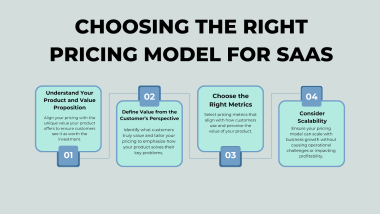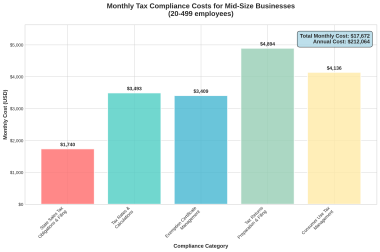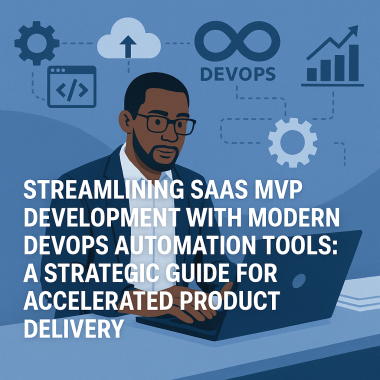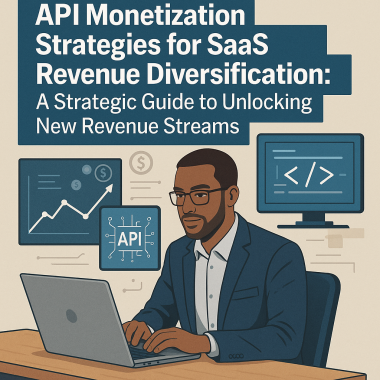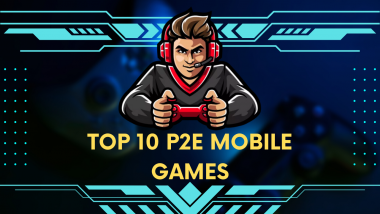The Evolution of Game Distribution: Paid vs Free Game Keys
Gone are the days when you had to physically purchase a CD or a cartridge to enjoy a new game. The digital revolution has drastically changed how games are distributed. Now you can simply download games directly onto your device. This revolution brought along a completely new invention – free game keys.
That came with a new question—should games be paid or free? Traditional logic says that you sell a product to make money. But hold on a minute; the digital age has blurred those lines, giving rise to free-to-play models, ad-supported games, and of course, the power of free game keys.
Navigating the Paradox: Can Freebies Actually Boost Sales?
Ah, the eternal question. Can giving something away for free actually help you make money in the long run? The short answer is yes, and it’s not just optimism talking. Offering free game keys can serve as a robust marketing tool, which we’ll dive into later. Plus, if you’re an indie developer looking to make your mark, those free keys can be the golden ticket you need to get noticed.
Getting to Know Steam Keys

What Are Steam Keys and Why Should You Care?
So what’s the deal with Steam keys, anyway? A Steam key is essentially a digital license for a game or software application on the Steam platform. It gives you, the player, or the buyer, access to your purchased content without the need for a physical disk. For developers, especially indie studios, understanding how to sell Steam keys can be vital for the overall sales strategy.
A Primer on Steam Key Activation

Here’s a quick rundown for the uninitiated. Once you obtain a Steam key, you simply input it into the Steam client to activate and download the game. The process is easy, user-friendly, and the key can usually be redeemed in a matter of seconds. For developers, the key is to make this process as seamless as possible to improve the user experience.
Where Do Free Game Keys Come From?
They appear to be magical entities, but free Steam keys usually come from two sources—official channels and third-party platforms. Official channels include the game developers or publishers who release the keys for promotional purposes.
Official Channels vs Third-Party Platforms
When you get a free game key from an official channel, you’re usually part of a promotion or a special event. These keys are generally considered safe and come with the support of the development team. On the other hand, third-party platforms are marketplaces that trade or sell Steam keys. These may not always be authorized, so caution is advised.
Aggressive Sales Tactics Or Free Game Keys
Okay, you’ve got your game developed, polished, and it’s ready to see the light of day. But, before you go all-in on those aggressive sales tactics, let’s pump the brakes for a moment and explore an alternate universe—the one where you give away your game for free. “Free?” you ask, eyebrows raised in surprise. Yes, free, as in zero dollars, as in costing nada. Sounds counterintuitive, right? But there’s method to the madness, and it’s not just about doling out freebies without rhyme or reason.
Benefits of Giving Away Free Steam Keys
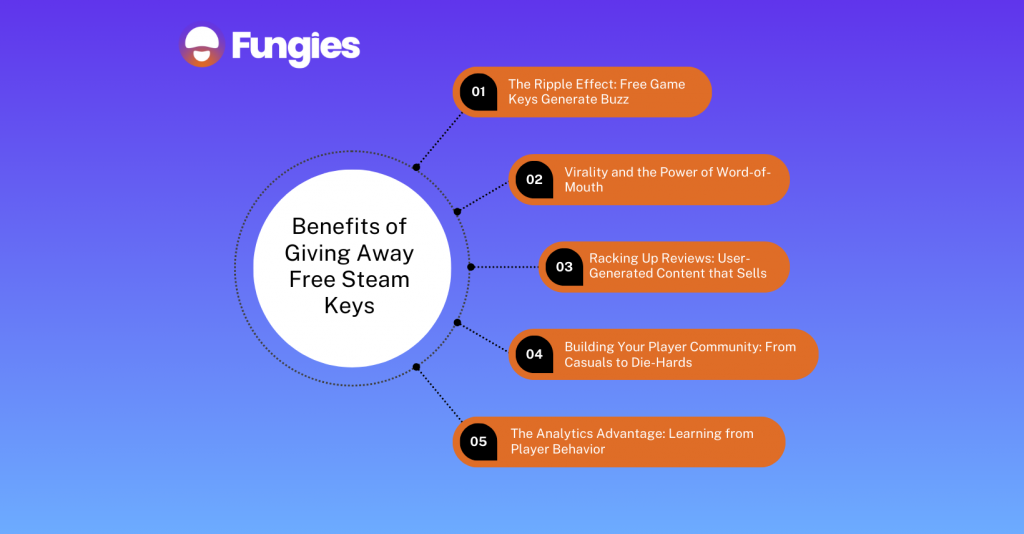
In this section, we’ll break down why giving away free Steam keys isn’t just good for gamers but can also be a strategic move that offers a multitude of benefits for you, the developer. From creating a buzz and racking up reviews to building a loyal player community, the benefits of free Steam keys are more far-reaching than you might initially think. So let’s dive in and decode the magic that unfolds when you give away those coveted keys.
The Ripple Effect: How Free Game Keys Generate Buzz
Let’s face it; we all love free stuff. But as a developer, giving away free Steam keys can create a ripple effect that leads to increased visibility and buzz around your game. Gamers share these keys, post about them, and essentially turn into micro-influencers on your behalf.
Virality and the Power of Word-of-Mouth
Word-of-mouth is the oldest form of advertising, and it’s still the most effective. Free Steam keys are your chance to get people talking about your game. When someone enjoys your game, they’re likely to recommend it to friends, write reviews, and generate the kind of organic buzz that money just can’t buy.
Racking Up Reviews: User-Generated Content that Sells
Reviews are gold. Seriously. Gamers look at reviews before making a purchase, and a flood of positive reviews can significantly affect your sales. Offering free Steam keys is a quick way to accumulate these reviews.
Building Your Player Community: From Casuals to Die-Hards
Ever wonder how to turn a casual gamer into a die-hard fan? Well, free Steam keys could be a stepping stone. These keys allow players to try your game risk-free, and if they like it, you’ve got yourself a community starting to form.
The Analytics Advantage: Learning from Player Behavior
Analytics are a treasure trove of insights, and free keys give you tons of data to sift through. You can track how players interact with your game, what features they love, and even where they drop off. This information is invaluable for future development.
The Revenue Angle: Selling Steam Keys as a Strategy
We’ve talked about the glorious power of giving away free Steam keys, and while it’s pretty darn nifty, at the end of the day, you’re in this to make money. This is a business, after all, not a charity event. So, how do you translate all the buzz from those free keys into cold, hard cash? The answer is not just in direct sales but also in a variety of creative, strategic methods to pump up those profit margins.

You might be thinking, “Hey, I know how to sell a game. Slap a price on it and let the money roll in.” Well, sure, that’s one way to do it. But if you’re stopping at that, you’re leaving a lot of potential money on the table. In this section, we’re going to dive into the nitty-gritty of making more bucks by selling Steam keys, and it’s not just by slapping a “For Sale” sign on your game. From setting the right pricing strategies to bundling and even cross-platform promotions, there are numerous tricks up the savvy indie dev’s sleeve. So, buckle up and let’s explore how to rake in the moolah while keeping gamers delighted.
Direct Sales: The Classic Path to Profit
Selling Steam keys is the straightforward, classic way to generate revenue. You set a price, and when someone pays, you hand over the digital key. It’s a tried-and-true method, but it’s not the only way to maximize your profits.
Strategic Pricing: More than Just Discounts
Price matters, but not just when it comes to discounts. You can also bundle games, offer seasonal pricing, or even create tiered packages to upsell additional content. The goal is to enhance perceived value, turning a single purchase into potentially many more.
Bundling and Partnerships: Getting Creative with Sales
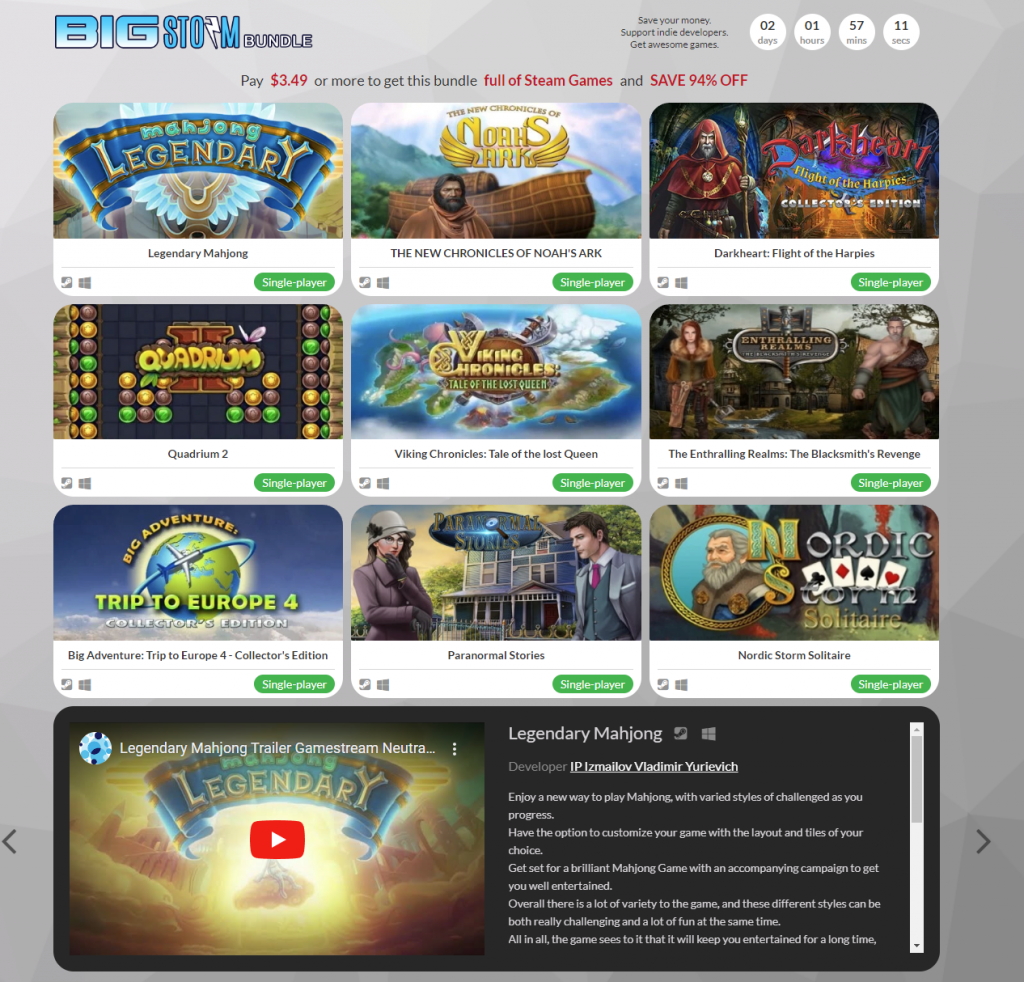
Why sell one game when you can sell three? Bundling allows you to package multiple games or add-ons, often at a discounted rate. Partnerships can also be lucrative. For instance, collaborations with platforms like Epic Games can further extend your reach.
Cross-promotions with Epic Games: Do Free Epic Games Keys Matter?
Think beyond Steam. Cross-promotion with other platforms can be a viable strategy. Free Epic Games keys, for example, can introduce your game to an entirely different audience who may then decide to explore your other offerings on Steam.
Finding the Right Balance: Give and Take
We hope you’ve got you excited about the idea of giving away free keys and empowered to make earn through direct sales. But here’s the kicker—how do you balance these seemingly contrasting approaches without causing chaos? A delicate balance between giving away free keys and your paid strategies can not only elevate your game’s status but also keep the revenue ticking. In this section, we’re going to talk about the art and science of finding that perfect harmony.
A Multi-Pronged Approach: Free Game Keys and Paid Strategies
Think of your marketing strategy as an ecosystem. The free keys get people through the door, and your paid strategies are what keep them there, spending money. Use the buzz created by your free key giveaways to fuel other types of revenue-generating activities, such as limited-time sales, special bundles, or even in-game purchases.
Timing is Everything: When to Release Free Keys
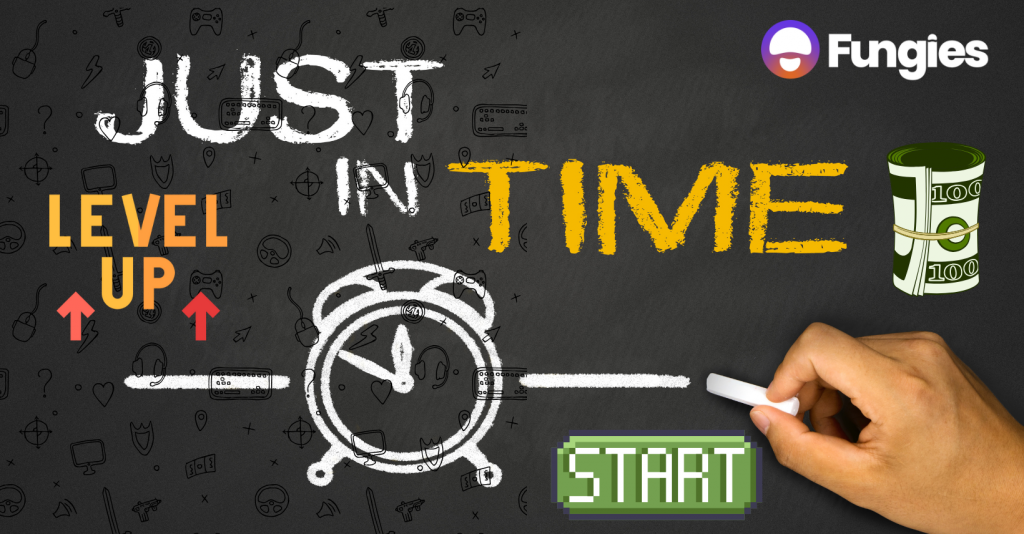
You wouldn’t launch a fireworks display at noon when no one can see it, right? The same principle applies to releasing free keys. Timing is crucial. Consider aligning your giveaways with significant events like content updates, gaming conventions, or even holidays like Black Friday. This maximizes the visibility of your offer and draws in the kind of crowd that’s already primed and ready to dive into something new.
Quality Over Quantity: Finding Your Golden Ratio
It’s tempting to go all out and flood the market with free keys, but restraint is key (pun intended). Distributing too many free keys can risk oversaturating the market, leading to the devaluation of your game. It’s crucial to find a sustainable ratio between free and paid keys—one that maintains the game’s perceived value while still drawing in new players. This might require some trial and error, along with keen analytics, to get right. But when you do, it’s gaming gold.
Risks of Overdoing Freebies: Inflation and Devaluation
So you’re enthusiastic about free keys. That’s great! But too much of anything can backfire. Giving away an excessive amount of keys can inflate the market and diminish the perceived value of your game. The last thing you want is for your game to be seen as a ‘bargain bin’ product. Your giveaways should always serve a larger strategic goal, whether it’s to boost initial interest, gather reviews, or to complement a broader marketing campaign.
Insider Tips for Indie Game Devs
Setting Up Limited-Time Giveaways: A How-To Guide
Limited-time giveaways can create a sense of urgency and exclusivity. Platforms like Gleam.io can help manage these types of promotions, making it easier for you to focus on development.
Utilizing Social Media: Tweet, Share, Repeat!

Social media is your best friend for promotions. Tweeting out free Steam codes or creating shareable content can exponentially increase your game’s visibility. And yes, it’s okay to ask fans to share your posts.
Building Relationships with Streamers and Influencers
Streamers and influencers can introduce your game to their audience, but how do you capture their attention? Offering free Steam keys is a start, but building a relationship is key.
How to Get Your Game Streamed: Cold Pitch vs Warm Introductions
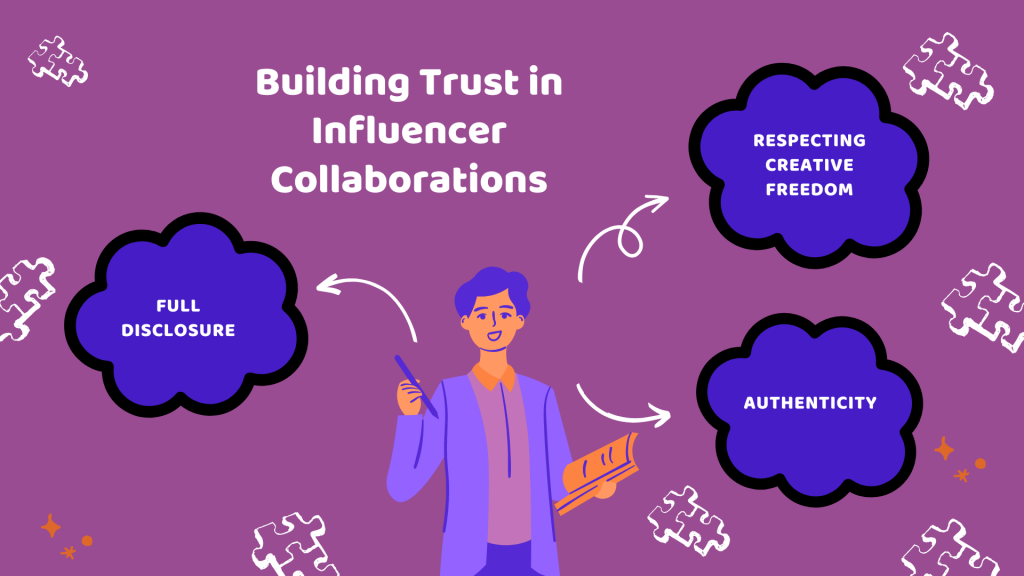
Cold pitches can work, but a warm introduction from a mutual contact can make all the difference. Prepare a compelling pitch and use any industry connections you may have for that warm intro.
Wrapping It Up: From Freebies to Long-Term Success
Navigating the world of game development and marketing is no small feat. It’s a complex ecosystem, made even more intricate by the myriad strategies available to get your game into the hands of eager players. Both free Steam keys and paid strategies offer unique advantages, from immediate buzz to sustainable revenue. But the magic lies in balancing the two in a way that complements your overall goals.
Employ a multi-pronged approach, taking advantage of the initial wave of interest generated by free keys to fuel your paid promotions. Keep an eye on timing, aligning your free key releases with significant events or updates to capture maximum attention. And remember, quality trumps quantity every time. Be strategic in the number of free keys you distribute to avoid oversaturation and devaluation of your precious game.
In essence, it’s all about striking that elusive yet rewarding balance between giving and taking. With the right strategy, not only can you maximize your game’s visibility but also achieve a stable, and potentially lucrative, revenue stream. So go ahead, experiment, analyze, and refine your strategy, and who knows? Your game could be the next big thing everyone’s talking about!
Bonus: Free Steam Codes and Where to Find Them
For Gamers: Navigating the World of Free Game Codes
Hey, we get it. Who doesn’t love scoring a free game? But while the allure of free Steam codes is hard to resist, not all that glitters is gold. Unfortunately, the web is a maze filled with deceptive websites and risky clickbaits, promising free game keys but delivering malware instead. Your best bet? Stick with tried-and-true platforms known for their credibility. Websites that partner with game developers or platforms like Steam are generally a safe bet. Trustworthy forums, subreddits, or even verified social media giveaways can also be golden tickets to legit free game codes. Just make sure you’re getting them from sources you can trust, so your enthusiasm doesn’t turn into a security nightmare.
For Indie Devs: Distributing Your Free Game Keys Safely and Effectively
As an indie developer, you want your free game keys to go into the right hands—those who’ll genuinely appreciate, play, and maybe even review or share your game. Don’t just throw keys into the virtual wind and hope for the best. Utilize platforms specifically designed to distribute Steam keys safely. Websites like Keymailer, Woovit, and even Steam’s own Curator Connect are solid choices. They offer the means to send keys to verified accounts, ensuring your keys aren’t misused or end up on gray market sites. These platforms often provide useful metrics as well, so you can track the reach and impact of your free keys.
A Quick Recap
Balancing free key giveaways with revenue-generating strategies might seem daunting, but it’s entirely doable—and potentially very rewarding. Whether you’re a gamer on the hunt for freebies or an indie developer aiming to boost your game’s profile, being informed and strategic can make all the difference. So, navigate wisely, act smartly, and let the world of free Steam keys unlock opportunities you never thought possible.
